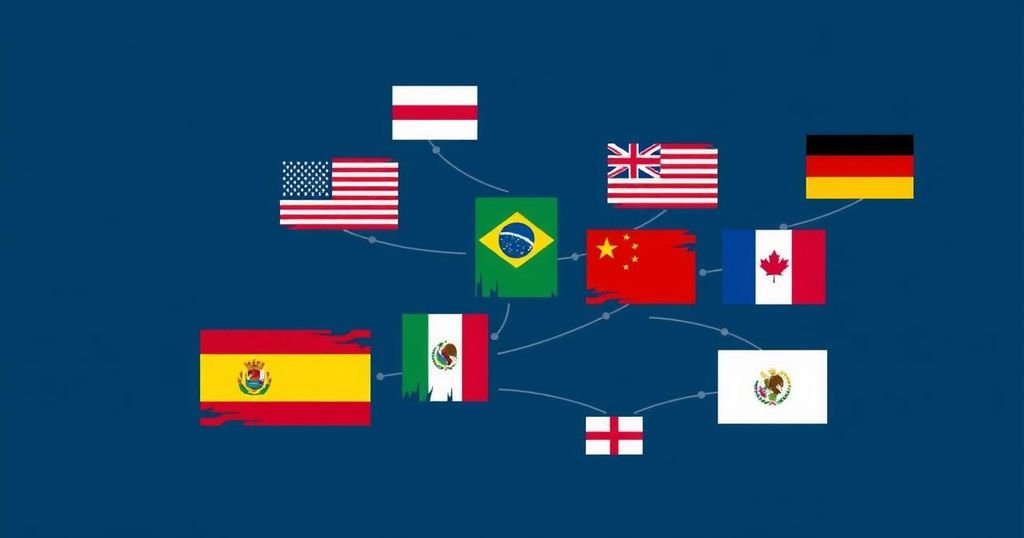The Biden administration announced it will not renew the humanitarian parole program for Venezuelans, Haitians, Cubans, and Nicaraguans, impacting over 500,000 migrants. As the initial authorizations begin to expire, many individuals may face deportation unless they secure alternative residency options. Concerns regarding the implications of this decision amid escalating political tensions are voiced by advocates, particularly given the pervasive crises in their home nations.
The Biden administration has decided not to renew the humanitarian parole program originally established to provide relief for Venezuelans, Haitians, Cubans, and Nicaraguans fleeing hardship in their home countries. Officials from the Department of Homeland Security confirmed that the program, which has allowed hundreds of thousands of individuals to legally enter the United States over the past two years, will be discontinued as the initial paroles begin to expire. Consequently, many of those who utilized this program will face departure from the U.S. if they lack alternative legal pathways to remain. The program was introduced in October 2022 for Venezuelans and subsequently expanded to Cubans, Haitians, and Nicaraguans by January 2023. It aimed to provide a legal route for migrants meeting specific health and background checks, with the requirement of having a financial sponsor in the U.S. As the expiration dates approach, uncertainty looms for over 500,000 individuals who may not secure their stays through Temporary Protected Status or other immigration avenues. While some migrants are eligible to apply for Temporary Protected Status, others may be compelled to return to their home countries, amid fears of potential persecution and instability, especially in Venezuela where the situation remains dire under the rule of Nicolás Maduro. The administration’s move comes in the context of upcoming elections and increased scrutiny over immigration policies, leading to heightened tensions surrounding border control and policy effectiveness. Concerns have been raised by various advocacy groups about the implications of discontinuing this program. The current political climate, characterized by criticism from Republican leaders and past assertions of administrative overreach regarding immigration authority, only adds to the complexity of the issue. As the end of this program approaches, advocates argue that many who remain without permanent residency options are left vulnerable. Furthermore, with upcoming deadlines for the expiration of existing authorizations, the Biden administration’s decision signals a potential shift in its approach to immigration, emphasizing the need for migrants to seek long-term solutions amidst changing policies and legal frameworks.
The humanitarian parole program was instituted under President Biden as a response to the increasing flow of migrants from certain Latin American countries facing severe political and economic crises. Targeting primarily Venezuelans, the program aimed to legally admit individuals escaping turmoil, followed by extensions to include Haitians, Cubans, and Nicaraguans. Initially recognized for its success in harmonizing immigration processes and decreasing illegal border crossings, the program eventually faced challenges and scrutiny from political opponents who leveraged the issues of immigration control against the administration. Currently, the expiration of the program intensifies the predicament for those reliant on it to remain in the U.S., as well as casts a shadow on the Biden administration’s broader immigration strategy as it navigates complex socio-political landscapes and public opinion leading into an election year.
In conclusion, the decision to terminate the humanitarian parole program for Venezuelans, Haitians, Cubans, and Nicaraguans marks a significant shift in U.S. immigration policy, potentially impacting hundreds of thousands of migrants who are uncertain of their future in the country. As expiration deadlines loom, those without alternative legal options may face deportation amidst political and humanitarian crises in their home countries. The implications of this decision resonate through various advocacy channels and highlight the broader challenges of navigating immigration policy amidst heightened political scrutiny.
Original Source: www.miamiherald.com






